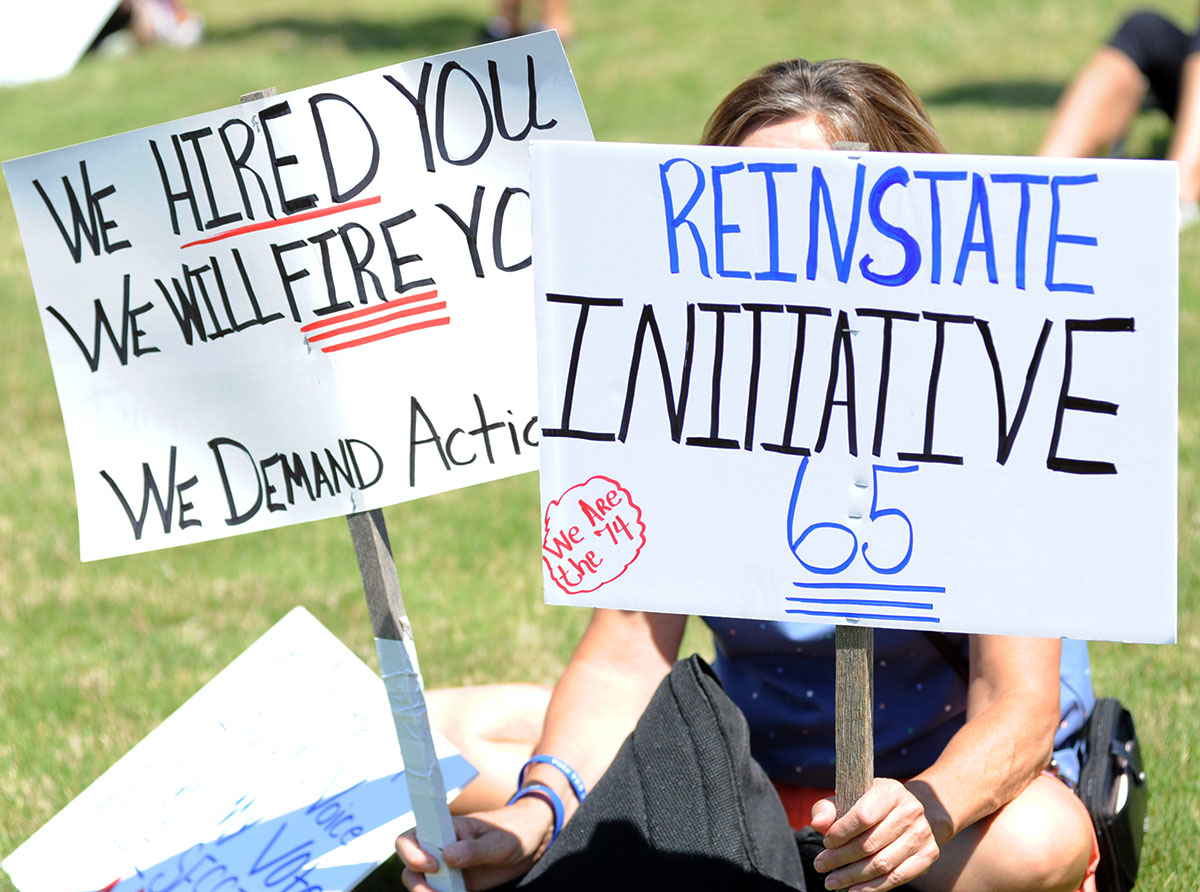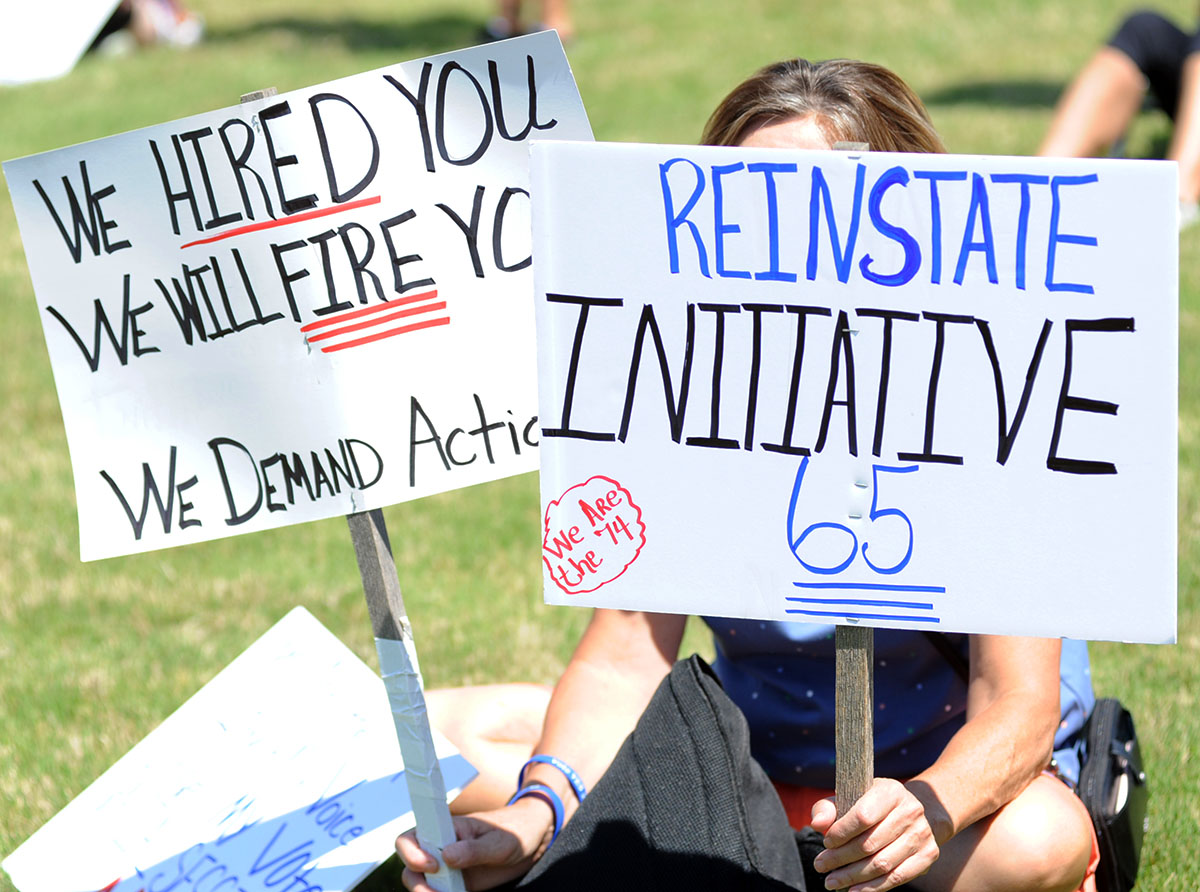Mississippi Today
Is ballot initiative a ‘take your picture off the wall’ issue for lawmakers?


Is ballot initiative a ‘take your picture off the wall’ issue for lawmakers?
In Mississippi legislative parlance, there are rare issues that can “take your picture off the wall” at the Capitol.
This refers to issues about which voters care so deeply that if a lawmaker doesn’t do right by them, they will oust him or her in the next election. Their photo will no longer be in the framed array of the current Legislature.
Monkeying with state retirees’ benefits, massive tax increases — there are only a few singular issues considered to have such statewide, grassroots gravitas. And in general lawmakers either treat them like a third rail on a subway, or else snap-to when it comes to a vote.
Is restoring voters’ rights to ballot initiative — the sidestepping the Legislature and putting an issue directly to a statewide vote — one of those take-your-picture-down issues?
Some elected leaders and candidates believe so. And some recent public polling and social media outcry would appear to back them up. Some citizens groups have tried to organize members to call and write lawmakers about it. Should the Legislature fail again to restore this right, it will likely be a campaign issue in many statewide and legislative races this year.
READ MORE: Restoring Mississippi ballot initiative process survives legislative deadline
A recent poll by Tulchin Research for the Southern Poverty Law Center Action Fund reported 65% of Mississippi voters surveyed support restoring ballot initiative rights, and only 14% opposed. Support crossed party, age, race and other demographic lines.
There’s no doubt many Mississippians across the spectrum were hopping mad when the state Supreme Court stripped voters of this right in 2021. This was with a ruling on medical marijuana, an instance where voters had taken matters in hand after lawmakers dallied for years on an issue. Legislative leaders were quick back then with vows they would restore this right to voters, fix the legal glitches that prompted the high court to rule it invalid.
But given the way they’ve fiddle-faddled on restoring the right for going on two years now, it would appear some legislative leaders don’t see it as top-of-mind for voters, or don’t believe voters are paying a lot of attention to particulars.
READ MORE: Mississippi Supreme Court strikes down ballot initiative process
Lt. Gov. Delbert Hosemann and his Senate Accountability Chairman, John Polk, R-Hattiesburg, in particular, haven’t exactly tripped over themselves in effort to restore voter’s right to a ballot initiative.
Polk’s initial draft of a measure this session essentially would have given voters ballot initiative rights in name only. It would have given the Legislature power to veto or amend citizens’ initiatives before they go before voters, sort of missing the whole point of a ballot initiative. It also would have required, on top of forcing initiative sponsors to collect more than double the signatures previously required to get something on the ballot, that sponsors get at least 10 signatures each from the state’s more than 300 municipalities. This would be a near impossible task.
Even after making some concessions, Senate Bill 2638would still require about 240,000 voter signatures to put something on the ballot compared to about 107,000 under the state’s previous initiative process. The Senate’s demands for requiring a large number of signatures killed reinstatement last year when the House wouldn’t go along.
Polk told his colleagues if he had his way, he’d require even more signatures for voters to bypass the Legislature, and he voted against the measure even though he was the one presenting it for a Senate vote.
Many political observers viewed Hosemann routing the measure to Polk’s committee again this year — instead of the Constitution or Elections committees — as a sign he’s not all that into restoring ballot initiative rights.
Sen. David Blount, D-Jackson, before last week’s Senate vote, appeared to warn his colleagues about only paying lip service to restoring the initiative.
“We’re about to find out soon where people really are, when we see if we get a legitimate, workable ballot initiative process,” Blount said. “… We need to be straight with people that we mean it.”
There are reasonable arguments for and against voter ballot initiative.
Voter initiative, a creation of the early 20th Century progressive movement, gave citizens the ability to overcome the influence of big money interests on legislatures, and can still serve as a valuable backstop. There are 25 states with some form of voter initiative or referendum (the power of voters to kill a law).
But Mississippi’s form of government, just like the nation’s, is a representative democratic republic, not a direct democracy where major policy or spending is decided by a majority vote of the masses. Our founding fathers were just as afraid of the “excesses of democracy” as they were of despotic kings, and they believed democracy should be tempered through legislative representation, protective of minority rights, and checked by the judicial and executive branches.
Polk warned last week that out-of-state interests can spend large amounts of money and harness social media campaigns to co-opt the ballot initiative process and force policy that is not truly grassroots.
The issue, as it did last year, will likely come down to House-Senate negotiations on a final version of restoration late in the legislative session.
And given its treatment thus far on High Street, reinstatement of voters’ right to take matters into their own hands is far from certain.
But any lawmakers involved in killing or watering down such rights are taking a risk. And voters could take their pictures off the Capitol walls.
READ MORE: 5 reasons lawmakers might not want to restore the ballot initiative
This article first appeared on Mississippi Today and is republished here under a Creative Commons license.
Mississippi Today
On this day in 1939, Billie Holiday recorded ‘Strange Fruit’

April 20, 1939

Legendary jazz singer Billie Holiday stepped into a Fifth Avenue studio and recorded “Strange Fruit,” a song written by Jewish civil rights activist Abel Meeropol, a high school English teacher upset about the lynchings of Black Americans — more than 6,400 between 1865 and 1950.
Meeropol and his wife had adopted the sons of Julius and Ethel Rosenberg, who were orphaned after their parents’ executions for espionage.
Holiday was drawn to the song, which reminded her of her father, who died when a hospital refused to treat him because he was Black. Weeks earlier, she had sung it for the first time at the Café Society in New York City. When she finished, she didn’t hear a sound.
“Then a lone person began to clap nervously,” she wrote in her memoir. “Then suddenly everybody was clapping.”
The song sold more than a million copies, and jazz writer Leonard Feather called it “the first significant protest in words and music, the first unmuted cry against racism.”
After her 1959 death, both she and the song went into the Grammy Hall of Fame, Time magazine called “Strange Fruit” the song of the century, and the British music publication Q included it among “10 songs that actually changed the world.”
David Margolick traces the tune’s journey through history in his book, “Strange Fruit: Billie Holiday and the Biography of a Song.” Andra Day won a Golden Globe for her portrayal of Holiday in the film, “The United States vs. Billie Holiday.”
This article first appeared on Mississippi Today and is republished here under a Creative Commons Attribution-NoDerivatives 4.0 International License.![]()
Mississippi Today
Mississippians are asked to vote more often than people in most other states

Not long after many Mississippi families celebrate Easter, they will be returning to the polls to vote in municipal party runoff elections.
The party runoff is April 22.
A year does not pass when there is not a significant election in the state. Mississippians have the opportunity to go to the polls more than voters in most — if not all — states.
In Mississippi, do not worry if your candidate loses because odds are it will not be long before you get to pick another candidate and vote in another election.
Mississippians go to the polls so much because it is one of only five states nationwide where the elections for governor and other statewide and local offices are held in odd years. In Mississippi, Kentucky and Louisiana, the election for governor and other statewide posts are held the year after the federal midterm elections. For those who might be confused by all the election lingo, the federal midterms are the elections held two years after the presidential election. All 435 members of the U.S. House and one-third of the membership of the U.S. Senate are up for election during every midterm. In Mississippi, there also are important judicial elections that coincide with the federal midterms.
Then the following year after the midterms, Mississippians are asked to go back to the polls to elect a governor, the seven other statewide offices and various other local and district posts.
Two states — Virginia and New Jersey — are electing governors and other state and local officials this year, the year after the presidential election.
The elections in New Jersey and Virginia are normally viewed as a bellwether of how the incumbent president is doing since they are the first statewide elections after the presidential election that was held the previous year. The elections in Virginia and New Jersey, for example, were viewed as a bad omen in 2021 for then-President Joe Biden and the Democrats since the Republican in the swing state of Virginia won the Governor’s Mansion and the Democrats won a closer-than-expected election for governor in the blue state of New Jersey.
With the exception of Mississippi, Louisiana, Kentucky, Virginia and New Jersey, all other states elect most of their state officials such as governor, legislators and local officials during even years — either to coincide with the federal midterms or the presidential elections.
And in Mississippi, to ensure that the democratic process is never too far out of sight and mind, most of the state’s roughly 300 municipalities hold elections in the other odd year of the four-year election cycle — this year.
The municipal election impacts many though not all Mississippians. Country dwellers will have no reason to go to the polls this year except for a few special elections. But in most Mississippi municipalities, the offices for mayor and city council/board of aldermen are up for election this year.
Jackson, the state’s largest and capital city, has perhaps the most high profile runoff election in which state Sen. John Horhn is challenging incumbent Mayor Chokwe Antar Lumumba in the Democratic primary.
Mississippi has been electing its governors in odd years for a long time. The 1890 Mississippi Constitution set the election for governor for 1895 and “every four years thereafter.”
There is an argument that the constant elections in Mississippi wears out voters, creating apathy resulting in lower voter turnout compared to some other states.
Turnout in presidential elections is normally lower in Mississippi than the nation as a whole. In 2024, despite the strong support for Republican Donald Trump in the state, 57.5% of registered voters went to the polls in Mississippi compared to the national average of 64%, according to the United States Elections Project.
In addition, Mississippi Today political reporter Taylor Vance theorizes that the odd year elections for state and local officials prolonged the political control for Mississippi Democrats. By 1948, Mississippians had started to vote for a candidate other than the Democrat for president. Mississippians began to vote for other candidates — first third party candidates and then Republicans — because of the national Democratic Party’s support of civil rights.
But because state elections were in odd years, it was easier for Mississippi Democrats to distance themselves from the national Democrats who were not on the ballot and win in state and local races.
In the modern Mississippi political environment, though, Republicans win most years — odd or even, state or federal elections. But Democrats will fare better this year in municipal elections than they do in most other contests in Mississippi, where the elections come fast and often.
This article first appeared on Mississippi Today and is republished here under a Creative Commons Attribution-NoDerivatives 4.0 International License.
Mississippi Today
On this day in 1977, Alex Haley awarded Pulitzer for ‘Roots’

April 19, 1977

Alex Haley was awarded a special Pulitzer Prize for “Roots,” which was also adapted for television.
Network executives worried that the depiction of the brutality of the slave experience might scare away viewers. Instead, 130 million Americans watched the epic miniseries, which meant that 85% of U.S. households watched the program.
The miniseries received 36 Emmy nominations and won nine. In 2016, the History Channel, Lifetime and A&E remade the miniseries, which won critical acclaim and received eight Emmy nominations.
This article first appeared on Mississippi Today and is republished here under a Creative Commons Attribution-NoDerivatives 4.0 International License.![]()
-

 News from the South - Alabama News Feed6 days ago
News from the South - Alabama News Feed6 days agoFoley man wins Race to the Finish as Kyle Larson gets first win of 2025 Xfinity Series at Bristol
-

 News from the South - Alabama News Feed6 days ago
News from the South - Alabama News Feed6 days agoFederal appeals court upholds ruling against Alabama panhandling laws
-

 News from the South - North Carolina News Feed5 days ago
News from the South - North Carolina News Feed5 days agoFDA warns about fake Ozempic, how to spot it
-

 News from the South - Virginia News Feed4 days ago
News from the South - Virginia News Feed4 days agoLieutenant governor race heats up with early fundraising surge | Virginia
-

 News from the South - Missouri News Feed5 days ago
News from the South - Missouri News Feed5 days agoAbandoned property causing issues in Pine Lawn, neighbor demands action
-

 News from the South - Oklahoma News Feed3 days ago
News from the South - Oklahoma News Feed3 days agoThursday April 17, 2025 TIMELINE: Severe storms Friday
-

 News from the South - Arkansas News Feed6 days ago
News from the South - Arkansas News Feed6 days agoTwo dead, 9 injured after shooting at Conway park | What we know
-

 News from the South - Georgia News Feed6 days ago
News from the South - Georgia News Feed6 days agoWall Street poised to add to last week’s gains when markets open Monday

















































